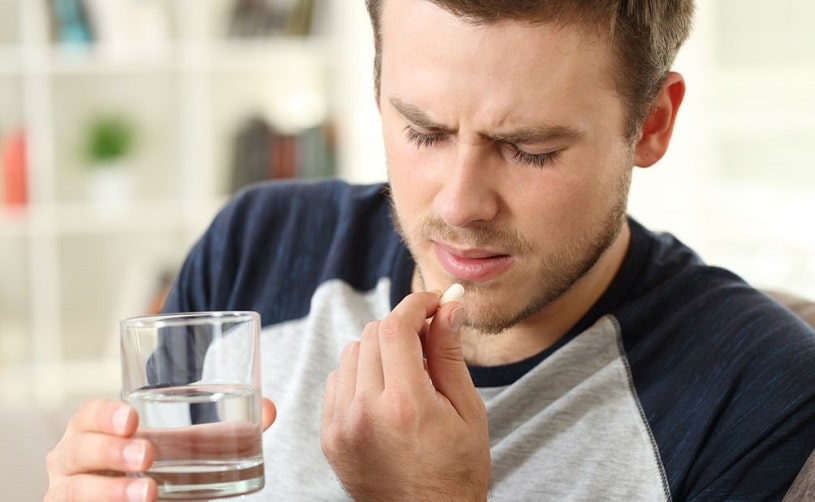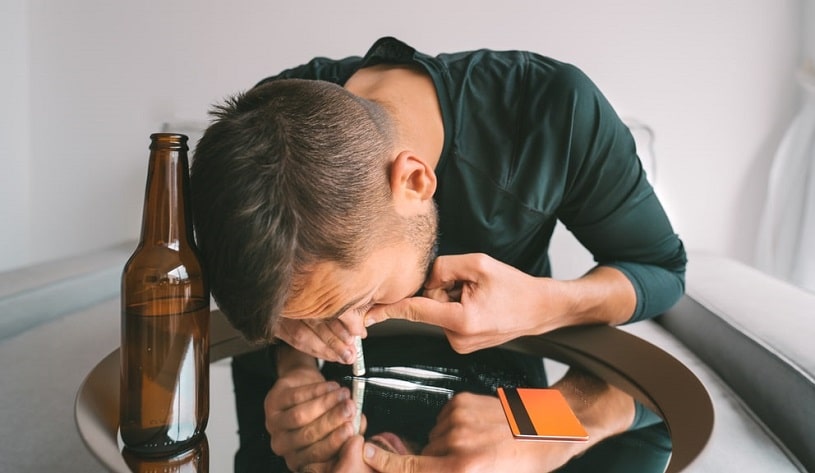Klonopin (clonazepam) is a potent benzodiazepine used in medical and non-medical settings to help induce sedation and tranquility. While clonazepam is typically taken orally, snorting clonazepam is on the rise as recreational users try to hasten the onset of effects. Snorting Klonopin is generally accomplished by crushing the pill and insufflating the powder into the nostrils.
Table Of Contents:
When people snort Klonopin, several things happen, including damage to the nasal cavities, lowered efficacy, and increased dosage as the person seeks to increase the drug results. These dangers to the health and treatment of addiction are covered in detail here.
Can You Snort Klonopin?
People take clonazepam for a variety of reasons. On a medical front, this drug is used to help treat severe health conditions such as seizures, anxiety disorders, muscle disorders, among others. Administered under close medical supervision, Klonopin dosage is titrated to the correct amount and then tapered off once tolerance begins and the dose loses its effectiveness.
Medical administration of Clonazepam always involves swallowing as a preferred means of administration. Because of its high solvency, ingestion via this route results in a relatively fast onset of effects, with peak plasma levels achieved in an hour. Swallowing clonazepam is also the safest way to take it, as it allows for slow release into the blood system.

In recreational settings, clonazepam is preferred due to its potency as a tranquilizer. About 20 times stronger than other benzodiazepines like diazepam, it is favored for its slow release and extended results. As tolerance builds and dependence forms, individuals on this drug will try and recreate the initial high they felt when they started taking it, and they do this by snorting Klonopin. The Klonopin snort phenomenon is a misguided attempt to speed up the results and reintroduce a vanishing high.
The Effects of Snorting Klonopin
When it comes to using this drug, ingestion is recommended over Klonopin insufflation in any case. When clonazepam is taken orally, it is absorbed quickly. About 90% of the initial dose will be available to the body, and the Clonazepam peak concentrations in the blood will be reached up to 4 hours after taking the medication.
This drug can exert its effects in the body similar to the way other benzodiazepines do. It potentiates the effects of the inhibitory neurotransmitter GABA. It can be thought of as reducing any excess electrical activity in the nervous system, so it is used to treat seizures and anxiety.
Meanwhile, when snorting Klonopin, the peak of the medication in the plasma is much quicker. It peaks anywhere between 15 to 20 minutes after Klonopin insufflation. It is several times faster than with oral administration, which is why so many are eager to snort Klonopin. This will result in a much quicker onset of action, though the potency is similar to when the drug is ingested. This is because the nasal mucosa has a rich blood supply and is thin, which allows the substance to enter the bloodstream directly after snorting clonazepam. However, as a fat-soluble substance, it is not entirely taken up.
However, there is a secondary peak after snorting Klonopin; some will find its way to the oral cavity and be normally absorbed there. This peak occurs 1.7 hours later.
Snorting Klonopin comes with specific Klonopin side effects.
Dangers of Snorting Clonazepam
There are a lot of consequences of Klonopin insufflation for those who snort Klonopin. Using a drug in a means that it is not intended to be used can cause a lot of damage to the body. This damage is related to the route of administration, and many of these dangers are around the respiratory system. It can also predispose the user to some diseases and conditions.
Some of These Dangers Include the Following:
Nose
Having an occasional Klonopin snort will lead to nasal irritation. When this increases, it can cause worse damage to the nasal mucosa.
It Can Lead to the Following:
- Recurring nosebleeds
- Nasal congestion
- Sinusitis
- Chronic sores in the nasal passage
- Reduced sense of smell (hyposmia) or loss of sense of smell (anosmia)
- Perforated nasal septum
Throat
For those who snort Klonopin a lot, much of the inhaled powder enters the mouth and the throat, where it can also exact its negative effects.
These Can Include:
- Chronic bad breath (halitosis)
- Sore throat
- Hoarse throat
Lungs
Klonopin insufflation can also result in this drug entering the lungs, and when this occurs several times, it damages the lung tissue. It can result in difficulty breathing and a chronic cough.
Diseases
The main worry about diseases that can arise from the Klonopin snort trend is infectious diseases. Most drug users get to a point where they abuse the drug with people who also snort Klonopin. In situations like this, paraphernalia gets passed around. For insufflated drugs, this paraphernalia includes straws and rolled-up papers used to inhale the powder. However, the state of health of the nasal mucosa of many addicts means that it may contain open sores and inflamed regions.
These can make bloodborne diseases like HIV and hepatitis a danger.
Risk of Addiction
Snorting Klonopin pushes it into the bloodstream much faster. This intense onset that it causes can be desirable to the user, and it is likely to cause significant changes to the brain chemistry faster than oral ingestion would.
It can result in the development of tolerance, pushing the person to use more of this drug, and then finally dependence, where they find themselves unable to function properly without using the medicine.
Overdose as a Result Of Insufflation
It is entirely possible to overdose from snorting Klonopin. It is more likely to occur with intranasal abuse of the drug than oral, for several reasons.
For instance, multiple tablets that have been powdered can not easily be divided into dosages. An addict will not be able to control the dosage of the drug that they plan to inhale, and it will be taken into the body at a much higher rate than it should normally be. This can significantly increase the risk of overdose occurring.

Besides this, an addict feeling that the drug’s effects are not potent enough can result in them repeating the dose several times in a short period. These doses can remain in the body for hours and cause a person to overdose on clonazepam.
Mixing other drugs with Clonazepam, such as opioids or drinking alcohol, can also result in an overdose. When other depressant drugs like alcohol or opioids are added to benzodiazepines, they can cause drug interactions that can be potentially fatal, mainly by initiating respiratory depression. Even in the prescribed use of clonazepam, one should avoid alcohol use.
Treatment For Clonazepam Abuse
Those who abuse this drug, whether orally or snorting clonazepam, should get help as soon as possible. Constant abuse of the drug can cause severe damage to the health, and the longer the addiction persists, the higher the risk of overdose.
It is not recommended to attempt a detox from a long-standing clonazepam addiction on one’s own. Sudden withdrawal symptoms from the drug can be highly uncomfortable.
Medical detox and rehab at a professional treatment center is the best option. Detox will help make the period with the most intense withdrawal symptoms easy to navigate for the patient, as they will be more comfortable. It will also help take care of other drug problems the patient may have besides addiction to benzodiazepines, such as alcohol dependence.

Detox can be done in an outpatient facility if the addict feels that they cannot take time off to reside in the treatment center or in an inpatient, staying in the clinic during their treatment. Inpatient treatment for detox is preferred as it allows for closer supervision.
Following treatment, the rehab period is important. Rehab is the follow-up phase where the patient is followed up after withdrawal symptoms have been taken care of. Rehab helps to repair the social, psychological, and occupational damage the addiction might have caused.
Snorting Klonopin Is a Danger
Snorting Klonopin is a major problem among those who abuse the drug. This method results in a much quicker onset of action. While this is desirable for many of these addicts, it also increases the chance of health complications and overdose, especially when mixed with other drugs like alcohol.
An addict needs to get treatment and rehab to stop snorting clonazepam as soon as possible. This way, health complications of addiction can be treated in time, withdrawal symptoms can be managed, and overdose can be prevented.
Hope Without Commitment
Find the best treatment options. Call our free and confidential helpline
Most private insurances accepted
Page Sources
- U.S. Food and Drug Administration, Klonopin Tablets (clonazepam), 2013, https://www.accessdata.fda.gov/drugsatfda_docs/label/2013/017533s053,020813s009lbl.pdf
- Schols-Hendriks, M. W., Lohman, J. J., Janknegt, R., Korten, J. J., Merkus, F. W., & Hooymans, P. M. (1995). Absorption of clonazepam after intranasal and buccal administration. British journal of clinical pharmacology, 39(4), 449–451. https://pubmed.ncbi.nlm.nih.gov/7640154/
- Yewell, J., Haydon, R., Archer, S., & Manaligod, J. M. (2002). Complications of intranasal prescription narcotic abuse. The Annals of otology, rhinology, and laryngology, 111(2), 174–177. https://pubmed.ncbi.nlm.nih.gov/11860072/
- Burrows, D. L., Hagardorn, A. N., Harlan, G. C., Wallen, E. D., & Ferslew, K. E. (2003). A fatal drug interaction between oxycodone and clonazepam. Journal of forensic sciences, 48(3), 683–686. https://pubmed.ncbi.nlm.nih.gov/12762549/

 Authored by
Authored by  Reviewed by
Reviewed by 
